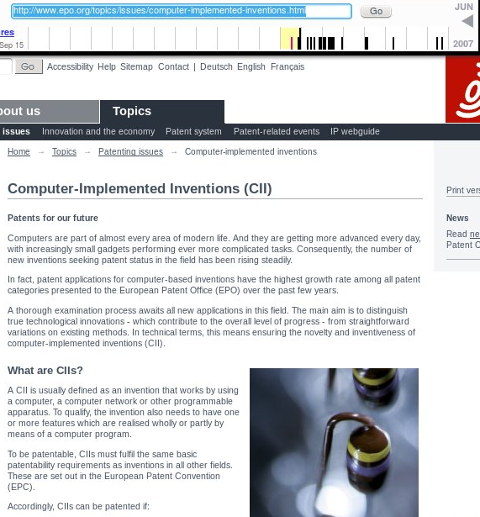They just refrain from using that particular term ("software patents")

Summary: “Global patenting and emerging technologies” conference in Munich seems to be all or mostly about algorithms; software patents are also being granted and there's no denial of it, there's no sense of shame over it
THE EPO has become even worse than the USPTO when it comes to granting abstract patents. At the USPTO there are at least examiners who bring up ۤ 101 and reject applications based on it. Not at the EPO.
There's
a new event being advertised by the EPO. This upcoming event was advertised just before the weekend. This is a propaganda event. The
corresponding page (
warning:
epo.org link) uses the typical buzzwords (ICT, 4IR, AI and so on) and the tweet says: "We're delighted to have such a great line-up of speakers for our upcoming “Global patenting and emerging technologies” conference in Munich on 29 November..."
What's in it? Here they go again:
The 4th Industrial Revolution continues to gather momentum, and the digital transformation is affecting all aspects of life, as shown by the EPO’s report on "Patents and the Fourth Industrial Revolution". Information and Communication Technologies (ICT) are converging with all traditional areas of technology.
This provides opportunities for emerging technologies such as Artificial Intelligence, capable of “Machine Learning” and optimising systems too complex for manually programmed algorithms; and Blockchain, for digital-speed processing of secure transactions.
The EPO's management basically tells people (applicants for instance) to put certain terms in their invention descriptions (or applications) for abstract patents to be granted on algorithms. On Friday the EPO
wrote: How do you draft a patent application for blockchain technology and should you consider other forms of IP protection too? We'll be discussing that and more in The Hague on 4 Dec: http://bit.ly/EPOblockchain18 pic.twitter.com/OiXvxYoARr"
EPO management also urges applicants to call algorithms "AI" and assures applicants along the lines of, "we'll bully our examiners to grant/enshrine that as a patent monopoly" (never mind whether or not courts will later object,
if that even reaches a court at all and perhaps the EPO hopes to replace national courts with a crooked UPC). On Friday the EPO
wrote again: "The EPO’s first-ever conference on the impact of #artificialintelligence on the patent system was intended to open up a discussion on this topic. You can read the main conclusions from the event here: http://bit.ly/AIpatents pic.twitter.com/NU3jTyh7Fb"
There has been a lot of rubbish like this lately -- so much that European law firms exploited the opportunity to promote themselves by googlebombing "AI" in relation to the EPO. They want applicants to come to them. Just before the weekend Frances Wilding and James Ward (Haseltine Lake LLP, which has been reposting stuff quite a lot lately)
wrote about the EPO further cheapening patents and/or tossing out patent quality. Everything is in the mix: "CII", "4IR", not to mention the above ("blockchain" and "AI").
To quote:
Computer-implemented inventions (CII)
CII generally involve software developments and can relate to almost any field of technology. An EPO report ("Patents and the Fourth Industrial Revolution, The inventions behind digital transformation" December 2017) recognizes that "innovation in the enhancement of products and processes is increasingly taking place in the virtual layer of software, rather than in any hardware components." and "A large proportion of current inventions are therefore based on software implementation." How the EPO deals with CII is probably of greater importance now than at any earlier time.
[...]
Issues pertaining to these "non-technical" subject-matters arise not infrequently in relation to CII. The aim for EPO examiners and applicants is to assess and ensure that a claimed CII does not fall on the "non-technical" (and hence inherently unpatentable) side of the line but falls on the "technical" (and hence potentially patentable) side of the line. The relevant EPO policies and practices for distinguishing between "non-technical" and "technical" have evolved over many years. Briefly, to fall on the "technical" side of the line, the claimed invention should find application in a field of technology and involve some aspect of "technicality" - technical character, technical contribution, or technical purpose.
This is the set of "Updated Guidelines For Examination At The EPO In Force 1 November 2018" that Wilding and Ward speak of. Software patents seem like the main 'feature' of that. It hardly surprises us, seeing for example how the EPO's advocacy of software patents doubled if not trebled when
António Campinos became President back in July.
⬆

